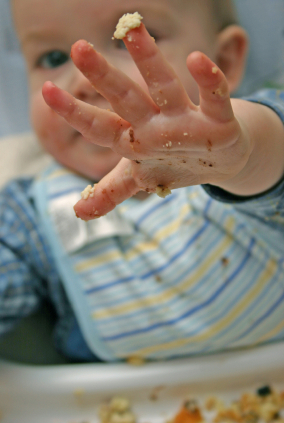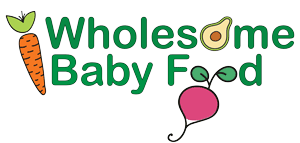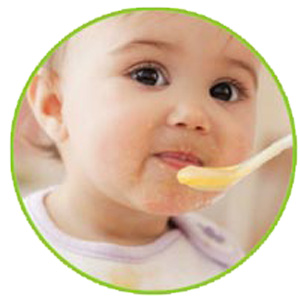 Get Ready For Solid Foods – Hooray!
Get Ready For Solid Foods – Hooray!
You think your baby may be ready to starting solid foods and you’re so excited, and probably confused and concerned too. Let’s first learn about what various medical organizations recommend as regards introducing babies to solid foods.
When And What Age Can Babies Start To Eat Solid Foods?
The AAP recommends the introduction of complementary foods be delayed until a baby is at least 4 months old, but exclusive breast-feeding is preferred until 6 months of age.
The AAP Section on Breastfeeding recommends exclusive breastfeeding for about 6 months.
The expert panel from the European Academy of Allergology and Clinical Immunology recommends introduction of complementary foods between 4 and 6 months of age in breast-fed or formula-fed infants
The World Health Organization recommends exclusive breast-feeding for the first 6 months of life.
The main consensus behind all of these expert recommendations is that that breast milk and/or formula should provide all the nutrition your baby needs during the first 6 months of life but it is acceptable to begin offering solids between 4 and 6 months of age – never any earlier. Starting babies on solid foods prior to four months old is not recommended.
Regardless of whether you start at four, five or six months, or even later, keep in mind that solid foods will not make up a large portion of your baby’s nutrition for quite a few weeks after you start.
Solid Foods are Complementary Foods
Remember that you are introducing your baby to solid foods, not suddenly changing your baby’s whole diet. At this point, the term “complementary foods” is often used instead of “solid foods” and this term best describes what the early role of solids is.
Take It Slow, Keep It Simple and Have Fun!
In the beginning, breast milk and/or formula remain most important and you are not not replacing them with solid foods. The first few weeks should be a time to take it slow, keep it simple and stay relaxed. Explore and enjoy the experience of watching your baby touch and taste his way through the wonderful world of food!
[/fusion_text][fusion_text columns=”” column_min_width=”” column_spacing=”” rule_style=”default” rule_size=”” rule_color=”” hide_on_mobile=”small-visibility,medium-visibility,large-visibility” class=”” id=””] Introducing Solid Foods to My Kids
Introducing Solid Foods to My Kids
Being a Mom of three boys, twins and a singleton, I have had my share of solid food adventures. Beginning solid foods is a phase of your baby’s development that should be fun and enjoyable and yes, it can be a bit scary and even sad too. I wanted to be sure to give you lots of tips and great ideas for making this transition as simple as possible. It’s important to know about sges and stages of foods and why some are better than others when beginning baby’s new food journey.
For example, broccoli may not be a great first food even if it’s not a known allergen. It causes many people to have gas (it is a cruciferous veggie) and we don’t want baby to be gassy! What to know why your baby’s poop is blue-ish/grey? Yep, I have poop colors covered too!
Did you know that some foods may turn your baby’s skin an orange color or that one specific food may cause baby’s urine to smell funny?
I hope you enjoy and get a lot of useful information from my website and my book The Wholesome Baby Food Guide. I hope that we will be your complete guide to introducing solid foods, creating delicious and wholesome baby foods and also making smooth eating transitions.
[/fusion_text][fusion_text columns=”” column_min_width=”” column_spacing=”” rule_style=”default” rule_size=”” rule_color=”” hide_on_mobile=”small-visibility,medium-visibility,large-visibility” class=”” id=””]Read all about the Signs Baby Is Ready To Eat Solid Foods
[/fusion_text][/fusion_builder_column][/fusion_builder_row][/fusion_builder_container]
